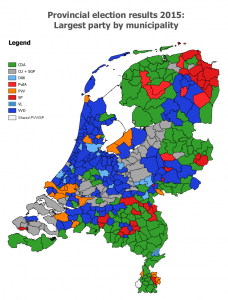There was a parliamentary by-election today in Hungary, in the seat of Tapolca, which encompasses a swath of the Balaton lakeshore and some of its hinterland, including the towns of Ajka (pop. 29,000), Tapolca (pop. 16,000) and Sümeg (pop. 6,000).
Viktor Orban’s governing, rightwing-populist Fidesz party already lost its two-thirds majority in parliament in February, when it lost a byelection in the neighbouring constituency of Veszprém. That seat was improbably picked up by a libertarian independent with the support of the left-wing opposition parties. A two-thirds majority is important because it allows the government to pass hard-to-repeal, so-called cardinal laws. But if I’ve understood things correctly, it only needs to be two-thirds of present MPs, not two-thirds of the total of elected MPs. So being only one seat short would still leave the government party with some leeway, as long as it’s disciplined enough.
This new by-election provided another chance to make that harder, so it was hard fought. The good news: Fidesz lost the seat. The bad news: it was won by the far-right Jobbik party instead.
Despite cumulative efforts to soften the party’s image, which have sped up recently, Jobbik remains on the hardcore end of European far-right parties, to the point where France’s Marine Le Pen and the Dutch firebrand Geert Wilders refuse to collaborate with them. But with the Fidesz government hemorrhaging support and the left/liberal opposition in perpetual disarray, it’s Jobbik that’s picking up floating voters.
In last year’s general elections, Jobbik won 20.3% of the vote, an even stronger result than the 17% it had won in 2010, when it came from zero. Over the last month or so, three pollsters have pegged its support at 24%; a third one put it at 30%. Meanwhile, they had Fidesz at 35-45%, the left/liberal opposition parties at 11-20%, and the greens at 5-8%.
In that light, the Tapolca result isn’t entirely unexpected, though the party had still been in third place in the constituency in last year’s general elections. This is how the results compare:
| Party |
Result 2015 |
Gain/loss |
| Jobbik |
35.3% |
+11.8% |
| Fidesz |
34.4% |
-8.7% |
| Socialists/Democratic Coalition |
26.3% |
-1.0% |
| LMP (Greens) |
2.1% |
-0.9% |
| Others |
2.0% |
-1.2% |
Turnout was some 42%, which is brisk for a by-election, especially in a traditionally low-turnout country like this; in last year’s general elections turnout in this constituency had only been 60%.
The left/liberal candidate only came first in Ajka; the rest of the constituency went for Jobbik (especially Tapolca and surroundings) or Fidesz.
Jobbik leader Gabor Vona called the result a defeat of “arrogance and corruption” and “a historic victory”. He’s right with the historic victory part. Hungary has a mixed electoral system: over half the MPs are elected in districts, through a winner-takes-all system (and Fidesz won 96 of the 106 such seats last year), and under half the seats are elected through a national party list vote. While Jobbik won 23 of the latter kind of seats last year, this is the first time it’s ever won a constituency seat. And it’s not even in the party’s north-eastern heartlands, but in the west of the country. It’s sure to scare Fidesz (which might move even further right in response) and leave the left feeling ambivalent at best.
Vona will presumably continue to try to “de-demonize” Jobbik, following Marine Le Pen’s electorally successful example. He’ll have a hard slog at it, because many Jobbik politicians are more Golden Dawn material. When he punishes a Jobbik MP who photographed himself spitting into a Holocaust monument by forcing him to lay a flower there, or punishes a local Jobbik councillor who posted on Facebook about buying guns to execute Roma by forcing him to live with a Roma member of the party for three days, it doesn’t exactly distract attention from the extremism of the party’s rank and file.
That holds true even if he does more Facebook contests asking his fans to send pictures of themselves posing with their pets; even if he’s suddenly talking about a “Western opening,” after the party steered a Russia (and Iran!)-friendly course for years; even if he now talks about the need of “sharing the sorrow of everybody, including the Jews.” And the Fidesz machine will do its part; it’s perhaps not a coincidence that the public prosecutor just started an investigation into a Jobbik MP describing the Holocaust as a fraud.
The question is whether voters will care. The Jobbik candidate in Tapolca won despite apparently having posted, and then deleted, a Facebook post calling the Roma a “biological weapon of the Jews”. But the Fidesz government really is arrogant and corrupt (and worse things, too). If voters want to punish Orban, and Jobbik’s the only opposition party that seems capable both of getting its act together, organizationally, and addressing rural, small-town and working class voters in a way they can relate to, that’s where ever more voters will go. Especially if, on the one hand, Jobbik keeps pushing out a “softer” image and, on the other hand, anti-semitic and xenophobic notions keep becoming more normalized in public discourse.
